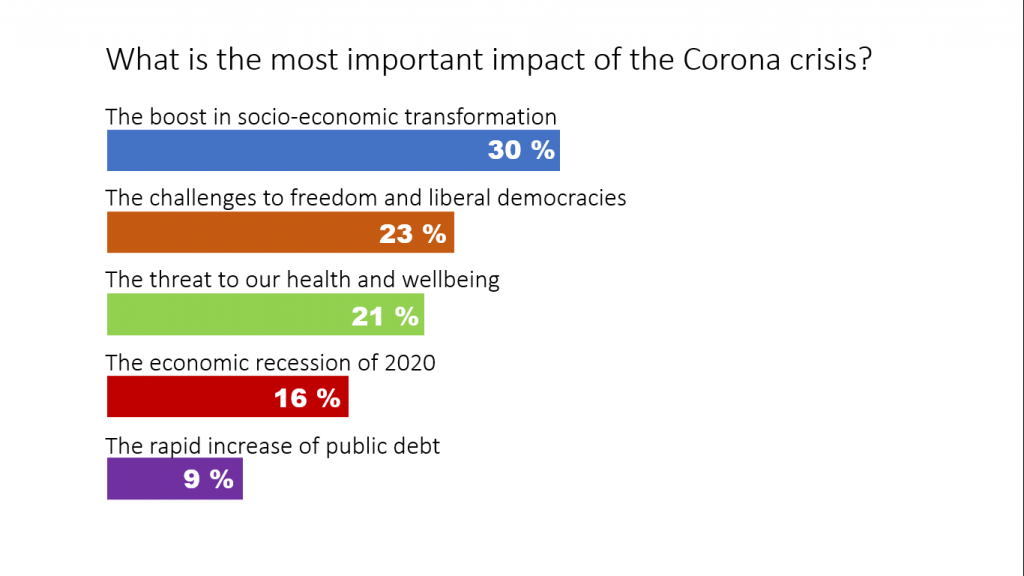
Moderator:
Rainer Münz, Expert in Demography & Migration
Panel:
Adrian Wooldridge, Political Editor and ‘Bagehot’ columnist, The Economist
Katherine Gehl, business leader, author and political innovator
Antonella Mei-Pochtler, Head of ‘Think Austria’, and
Hermann Simon, Founder & Honorary Chairman of Simon-Kucher & Partners
Drucker Forum 2020
Long story short: In the end we’ll need both, a new system and leadership that builds state capacity. The Covid crisis revealed a capacity divide between East and West and accelerated already existing international economic trends. We may be in something like a “The Emperor has no clothes” moment: no leader and no amount of leadership can compensate for a fundamentally dysfunctional system that rewards the results we’re currently getting, as Katherine Gehl put it.
The Drucker Forum Panel on “Leading Change on a Wider Stage” discussed the role of leadership in wider systems and networks such as democratic institutions, geopolitical dynamics, and capitalist systems. It provided sobering insights as well as inspiration for possible solutions to a leadership and systems crisis, that was not created, but revealed by the current Covid crisis.
The Covid Crisis: a test of state capacity
Adrian Wooldridge argued that the Covid crisis serves as a test of state capacity. While the East has done comparatively well, the West, especially the US and Great Britain, haven’t done well at all. Around 1500, China was the center of global civilization with 20 percent or more of global GDP and the world’s best state capacity. China stopped improving the state and the West has reinvented the State, first by creating the Nation state, and then the liberal state, which introduced accountability, some democracy and open competition for appointments etc. This was followed by the rise of the welfare state. This process of improving state capacity in the West went on while stasis prevailed in China. Then, after the 1960s, the West became unfocused and a captive to vested interests, and stopped solving problems. In the Far East, by contrast, emerged Lee Kuan Yew’s Singapore, which put certain long-term decisions in the hands of the state and created a developmental system that uses the state to galvanize the economy. This model is now being copied in China, so regaining state capacity while America is deteriorating. The vital point to learn from this pandemic is to recognize this trend and start re-modernizing the state, through galvanizing a new leadership class.
Antonella Mei-Pochtler split the crisis into several different layers: A health crisis with a clear divide between the countries that have well performing health systems and those that don’t; an economic crisis, a job crisis intertwined with an existing reskilling crisis, an education crisis with a rough 100 million kids worldwide without education during the crisis, a humanitarian crisis and a debt boom, not yet a crisis, with an enormous increase of debt levels by 360 percent of GDP.
The Austrian government addresses this challenge with a Future Operations Platform, a collaboration between science, politics, business, and civil society that deals with the health crisis, with the increased resilience in supply chains, the economy and finance, and the psycho-social setup of citizens. The government acts as an orchestrator, not as the leader of stakeholders.
“Slowbalization” and shifts in the global economy
What will happen when an economic structure, frozen by financial aid, will meet a new world in 2021? This question, posed by Rainer Münz, was taken up by Hermann Simon with an analysis of trends that were clear before Covid, but are now accelerating:
After a period of hyper-globalization from 1990 to 2010 with exports growing double global GDP we have seen a period of relative de-globalization since 2010. Exports only grew at a rate of around 0.6 of the Global GDP. This does not constitute the end of globalization but just a change. Exports will be replaced with direct foreign investments. This should ensure production and operations can cater to different local regulations, but with the same ownership.
A leadership or a systems problem?
Katherine Gehl insisted that “we have to change the system in order to change the outcome”. Her point was that certain interest groups influence both sides in the United States, so that “You’re more likely to get re-elected if you do not solve certain problems.” Gehl’s analysis: No leader and no amount of leadership will get us out of what is fundamentally a dysfunctional system. Hoping for the one mythical president to appear who will fix our system wastes the time to actually fix the core problem that we reward the wrong results. This issue is mirrored in other Western states, notably the UK, and again manifests itself in the shareholder value conundrum that grips so much of corporate life.
The quality of leadership is phenomenally important, it just cannot substitute for an effective system and in the end we’ll need both.
A poll with participants at the beginning showed quite surprising priorities:

About the Author:
Isabella Mader is CEO of the Excellence Institute, Executive Advisor for the Global Peter Drucker Forum and lecturer at universities in the fields of information and knowledge management, IT- strategy and collaboration.
This article is one in the “shape the debate” series relating to the fully digital 12th Global Peter Drucker Forum, under the theme “Leadership Everywhere” on October 28, 29 & 30, 2020.
#DruckerForum

